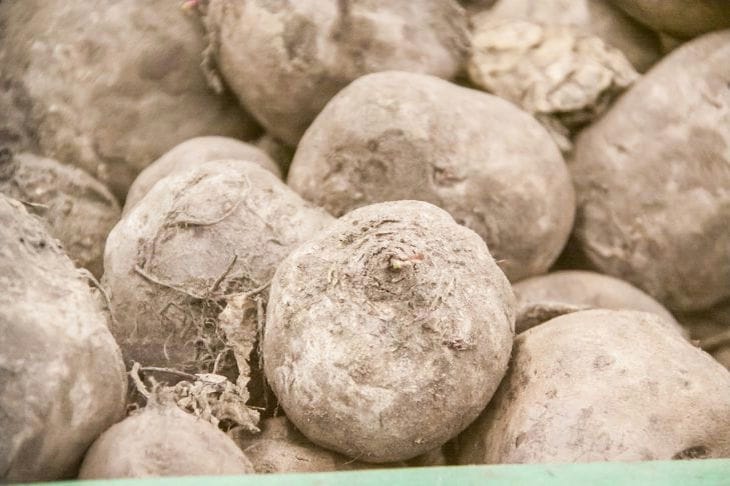Beetroot is extremely nutritious and has health benefits for humans.
It should definitely be a regular part of any balanced diet. It is inexpensive, easily accessible, and can be used to prepare a variety of dishes.
The nutritional value of the root vegetable is very high. With low calorie content, it contains many vitamins and minerals.
In fact, it contains almost all the nutrients that the human body needs. It is especially rich in vitamin B9, which is essential for heart health.
Also contains high amounts of manganese for bone formation and good nutrient metabolism.

Another ingredient is copper, which increases energy levels and intellectual performance.
Microelements contained in boiled vegetables:
- folic acid,
- manganese,
- copper,
- potassium,
- magnesium,
- Vitamin C,
- vitamin B6,
- iron.
Beets take care of your brain, heart and digestive health, are a great addition to a balanced diet, slow down the development of cancer cells. And most importantly, they are delicious.
9 Reasons to Include It in Your Diet
Contains substances with anti-cancer properties. According to research, its extract can slow down the division of cancer cells, and high levels of betalain in the blood reduce the risk of developing the deadly disease.
Although research on the presence of vegetables in the diet for cancer is still ongoing, regular consumption of them will definitely not hurt.
Controls calories. There is no better helper in healthy eating than beets. They are low in calories and fat. They are also rich in water, which helps balance the energy consumed.
It copes well with excess weight. Despite the low energy value, it contains a sufficient amount of protein and fiber, making it easier to maintain a healthy weight.
Fiber has a good effect on the digestive system, reduces appetite and helps you feel full after eating, thereby reducing the number of calories consumed.
Supports brain function. As we age, our brain functions worse, cognitive functions decline, and the risk of developing disorders (caused by damage to nerve cells) such as dementia increases.
Nitrates contained in the root vegetable improve brain function due to their vasodilating effect.
This activates blood flow to the brain and makes it work better. Drinking the juice has also been shown to reduce reaction time.
Improves athletic performance. Nitrates included in the composition increase the efficiency of mitochondria, which are responsible for energy production in cells. Regular drinking of juice increases endurance and optimizes the performance of the entire cardiac system. The peak level of nitrates in the blood occurs 2-3 hours after consuming the product.
Fiber stimulates digestion processes, maintaining favorable bacterial flora in the intestines. It also has a positive effect on the regularity of bowel movements and can prevent constipation and intestinal inflammation. A diet high in dietary fiber reduces the risk of many chronic diseases, including type 2 diabetes and colon cancer.
Fights inflammation. Beetroot not only protects against the development of certain diseases, but also helps treat existing ones. It has a number of anti-inflammatory properties, making it ideal for the diet of people suffering from heart disease and obesity.
Effective in treating joints. Ideal for the diet of people with osteoarthritis. The use of betalain obtained from the extract reduces pain and discomfort caused by arthritis.
Activates the immune system. The vitamins and microelements included in the composition strengthen the immune system, increase resistance to viruses and bacteria.
Normalizes blood pressure. Beets have been well studied for their ability to lower high blood pressure, which is a major risk factor for heart disease.
Regular consumption of its juice can significantly reduce both systolic and diastolic blood pressure. It is better to eat it raw than boiled.
The body converts the resulting nitrates into nitric oxide, which dilates blood vessels and thus causes a decrease in blood pressure.
To fully experience the health benefits, you need to consume it regularly. There are several ways to include it in your diet.
For example, steam or marinate, boil or bake, blend or juice. Can be eaten raw - thinly sliced or grated.
Earlier wewrote about what will happen if you eat only vegetables every day.








